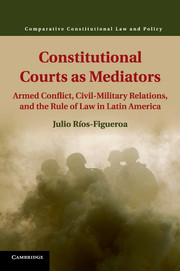 Constitutional Courts as Mediators
Constitutional Courts as Mediators Book contents
- Frontmatter
- Dedication
- Contents
- List of Figures
- List of Tables
- Acknowledgments
- 1 Constitutional Courts and the Armed Forces
- 2 A Theory of Constitutional Courts as Mediators
- 3 Constitutional Jurisprudence on Military Autonomy in Colombia, 1958–2013
- 4 Constitutional Jurisprudence on Military Autonomy in Peru, 1979–2013
- 5 Constitutional Jurisprudence on Military Autonomy in Mexico, 1917–2013
- 6 Judicial Regulation of the Use of Force in Colombia, Peru, and Mexico
- 7 Constitutional Courts as Mediators beyond Latin America
- 8 Constitutional Courts and Democratic Confl ict Solving
- References
- Index
2 - A Theory of Constitutional Courts as Mediators
Published online by Cambridge University Press: 05 May 2016
- Frontmatter
- Dedication
- Contents
- List of Figures
- List of Tables
- Acknowledgments
- 1 Constitutional Courts and the Armed Forces
- 2 A Theory of Constitutional Courts as Mediators
- 3 Constitutional Jurisprudence on Military Autonomy in Colombia, 1958–2013
- 4 Constitutional Jurisprudence on Military Autonomy in Peru, 1979–2013
- 5 Constitutional Jurisprudence on Military Autonomy in Mexico, 1917–2013
- 6 Judicial Regulation of the Use of Force in Colombia, Peru, and Mexico
- 7 Constitutional Courts as Mediators beyond Latin America
- 8 Constitutional Courts and Democratic Confl ict Solving
- References
- Index
Summary
What Do Constitutional Courts Do?
The basic social logic of courts and judges is rooted in the triad for conflict resolution: whenever two actors come into a conflict that they cannot solve themselves, they call upon a third for assistance (Shapiro 1981, 1). According to this simple but universal view of courts, the effectiveness and efficiency of the third party are related to the extent that she is impartial to the issue in dispute and neutral regarding the parties in conflict, as well as to the extent to which she applies preexisting legal norms after adversary proceedings (Shapiro 1981). The immediate role of courts would then be to arbitrate specific disputes of various sorts within a political community.
But courts are also means for achieving other, more general or proximate, normatively appealing goals through the resolution of those specific disputes. For instance, according to modern political thinkers, along with the other branches of government, courts partake in creating a moderate or balanced system of rule. This is what Montesquieu famously called “the liberty of the constitution” in The Spirit of the Laws. Montesquieu argued that judges should be either the “mouthpiece of the law … mere passive beings incapable of moderating either its force or rigor” (VI 6), or political actors that “deliberate, communicate their thoughts, argue […and…] change their minds” (VI 4). There is no contradiction: for Montesquieu the role of judges and of the judicial organ depends on how close a given regime is to the desired moderate government. In republics, where non-arbitrary government is already established by the separation of executive and legislative powers, judges should play a minimum role and the judiciary should be so weak as to become a “null power.” But in monarchies, where the executive and legislative powers are concentrated in the king, a permanent judicial organ and deliberative judges are necessary for checking power and preserving the balance of government.
Moreover, recent political science scholarship on courts and judges has gone one step further: courts not only check the government, disabling arbitrary actions, but they can also enable the government to reach other goals.
- Type
- Chapter
- Information
- Constitutional Courts as MediatorsArmed Conflict, Civil-Military Relations, and the Rule of Law in Latin America, pp. 18 - 45Publisher: Cambridge University PressPrint publication year: 2016
